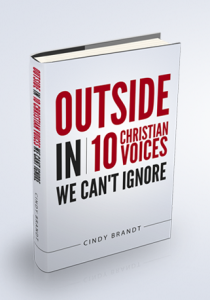[This guest post is by Cindy Brandt, who is generously offering her new book “Outside In” for FREE. Details at the bottom of this post.]
“If the Christian is too busy to stop, take spiritual inventory, and receive his assignments from God, he becomes a slave to the tyranny of the urgent.”
~ Charles Hummel
The city we served in as missionaries had a population of 13 million people. We joke that it’s the biggest city no one’s ever heard of. Let’s assume Jesus had a good model of leading 12 disciples. In order to make disciples of 13 million, doing the quick math, we would need 1.08 million Christian leaders. At the time we were serving, our organization had a whopping 60 members! Anyone who has ever served in any capacity in ministry can tell you: The needs are unrelenting. There is always more, more, and more to do for ministry staff and volunteers.

However, the people coming into church are already bone-weary from modern life. Busy-ness has become an epidemic in society. According to an article in Forbes magazine, the average worker receives 100-200 emails a day. The inbox has become an oppressive list of to-do’s, sucking the life out of us. We have lost sight of a healthy balance of work and play, as the technology we carry in our pockets brutally erases that line between productivity and leisure.
Can the church become a place of refuge for rest, or does it add to the burden of already busy people, perpetuating a cycle of busy-ness and burnout?
The realities of burnout among those serving in churches have been well documented over the last 25 years. Busy Christians arrive at church hoping to catch a breath from the weekly grind, to be filled with life-giving teaching, to recalibrate their souls, and to be refreshed for the next week. Maybe that’s what they find on their first few visits, but before long they are invited to attend various programs and activities, and then asked to lead or coordinate, and soon enough, Sunday becomes just as draining as the rest of the work week, if not more so. In many ways, the Christian culture has coopted the mainstream culture of glorifying busy-ness, promoting the idea that busy = better. Busy = godlier. Busy = more spiritual.
There is an actual hymn out there titled, “Let Us Burn Out for Thee, Lord Jesus.” It is true that loving and caring for people is a ’round-the-clock job, and it’s hard to justify resting when the job description is “working for God.” So we soldier on for the Lord, even as our emotional, spiritual, and physical bodies break down from simply doing more than we can handle. The result is we are left incapacitated in our church life, or we leave altogether in order to find relief.
There is no shortage of spiritual practice books offered on the Christian market for the Christian who seeks to become a Better Christian. Hip, new ways of prayer and contemplation are introduced in a steady stream:
Twelve books to read in observance of Lent,
Ten activities to do with your children during Advent,
Five steps to a better marriage.
One doesn’t need to look far to be sold on more things to practice to become more spiritual. Part of the reason busy Christians long for church is because the drain of modern life has run us ragged, leaving us empty. However, we are given the message that in order to draw closer to God, we must add more practices into their lives. Instead of feeling refreshed, we are left with a growing list of spiritual to-do’s or burdened by the guilt of not taking on extra practices.
Author Ed Cyzewski says we need to learn to grow through subtraction. Often the times we are most likely to hear or feel the presence of God are when we are still and quiet. When we strip down the distractions of everyday life, or even when we take away supposedly spiritual practices and simply do less, we allow room for God to manifest in ways that aren’t manufactured by our human bidding. I’m not saying there isn’t a place for guided practices. Many people find them helpful. However, consider that growth may not come from adding one more memory verse, prayer, Bible study, or ministry. The church has an opportunity to be counter-cultural when we reject economic productivity models and value the slow movement of tending our spirituality. In nurturing our faith, less is often more.
 We worship a God who commands Sabbath as a day of rest. In a culture that feeds our frenzy of wanting more, needing more, working more, God wants to say we are enough. We don’t need to do more to earn God’s love. Our needs and wants are satisfied deeply through a meaningful communion with God and the relationships we cultivate in community. As the epidemic of busy-ness continues to encroach upon our modern lives, threatening our well-being, let’s allow the church to be an antidote to the poison. Let Sundays truly bring rest to busy Christians as we share the deep joy of simply abiding in God, recharging spiritually to face a new week filled with the abundant grace of knowing we are enough for God.
We worship a God who commands Sabbath as a day of rest. In a culture that feeds our frenzy of wanting more, needing more, working more, God wants to say we are enough. We don’t need to do more to earn God’s love. Our needs and wants are satisfied deeply through a meaningful communion with God and the relationships we cultivate in community. As the epidemic of busy-ness continues to encroach upon our modern lives, threatening our well-being, let’s allow the church to be an antidote to the poison. Let Sundays truly bring rest to busy Christians as we share the deep joy of simply abiding in God, recharging spiritually to face a new week filled with the abundant grace of knowing we are enough for God.
[This is an edited excerpt of Cindy Brandt’s new book, Outside In: Ten Christian Voices We Can’t Ignore. Learn more about the book and get it for free.]
About the Author:
 Cindy Brandt writes about faith in the irreverent, miracles in the ordinary, and beauty in the margins. She is more interested in being evangelized than evangelizing, a social justice Christian, and a feminist. She blogs at cindywords.com, tapping words out from the 33rd floor of a high rise in Taiwan, where she lives with her husband, two children, and a miniature Yorkie.
Cindy Brandt writes about faith in the irreverent, miracles in the ordinary, and beauty in the margins. She is more interested in being evangelized than evangelizing, a social justice Christian, and a feminist. She blogs at cindywords.com, tapping words out from the 33rd floor of a high rise in Taiwan, where she lives with her husband, two children, and a miniature Yorkie.
photo credits: Overpass (Central), Cindy Brandt
